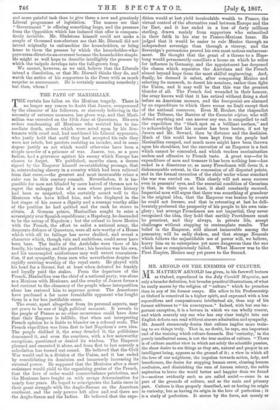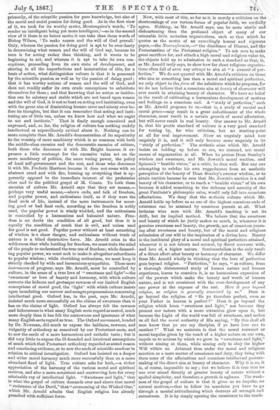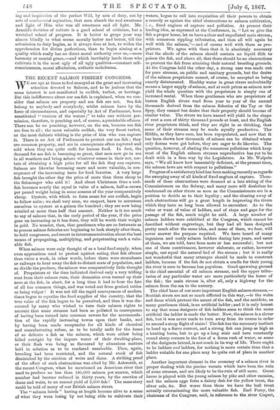MR. ARNOLD ON THE ENEMIES OF CULTURE. MR. MATTHEW ARNOLD
has given, in his farewell lecture INJL at Oxford, reproduced in the July Cornhill Magazine, not only a broader definition, but broader practical illustrations, of what he really means by the religion of " culture" which he preaches than in any of his former essays. His adieu to his Professorship at Oxford is conceived in a higher spirit, and expressed with a less supercilious and compassionate intellectual air, than any of his former addresses to " his countrymen." Indeed, with but one im- portant exception, it is a lecture in which we can wholly concur, and which scarcely any one who has any clear insight into our English defects can read without sincere admiration and sympathy. Mr. Arnold strenuously denies that culture implies mere train- ing to see things truly. That is, no doubt, he says, one important end of the training which culture demands. But 'curiosity,' in the purely intellectual sense, is not the true motive of culture. "There is of culture another view in which not solely the scientific passion, the sheer desire to see things as they are, natural and proper in an intelligent being, appears as the ground of it ; a view in which all the love of our neighbour, the impulses towards action, help, and beneficence, the desire for stopping human error, clearing human confusion, and diminishing the sum of human misery, the noble aspiration to leave the world better and happier than we found it—motives evidently such as are called social—come in as part of the grounds of culture, and as the main and primary part. Culture is then properly described, not as having its origin in curiosity, but as having its origin in the love of perfection ; it is a study of perfection. It moves by the force, not merely or primarily, of the scientific passion for pure knowledge, but also of the moral and social passion for doing good. As in the first view of it, we took for its worthy motto, Moutesquieu's words, ' To render an intelligent being yet more intelligent,'--so in the second view of it there is no better motto it can take than these words of Bishop Wilson, To make reason and the will of God prevail.' Only, whereas the passion for doing good is apt to be over-hasty in determining what reason and the will of God say, because its turn is for acting rather than thinking, and it wants to be beginning to act, and whereas it is apt to take its own con- ceptions, proceeding from its own state of development, and sharing in all the imperfections and inmaturities of this, for a basis of action, what distinguishes culture is that it is possessed by the scientific passion as well as by the passion of doing good ; that it has worthy notions of reason and the will of God, and does not readily suffer its own crude conceptions to substitute themselves for them ; and that knowing that no action or institu- tion can be salutary and stable which are not based upon reason and the will of God, it is not so bent on acting and instituting, even with the great aim of diminishing human error and misery ever be- fore its thoughts, but that it can remember that acting and insti- tuting are of little use, unless we know how and what we ought to act and institute." That is finely enough conceived and expressed, and, so far, the religion of culture has nothing unduly intellectual or superciliously critical about it. Nothing can be more complete than Mr. Arnold's demonstration of its superiority to the worship of mere machinery which is so common with both the middle-class enemies and the democratic enemies of culture, both those who denounce it with Mr. Bright beeause it ex- presses a little contempt for the excessive value set on the mere machinery of politics, the mere voting power, the policy of local self-government and the rest, and those who denounce it with Mr. Frederic Harrison because it does not come with an abstract creed and with fire, burning up everything that is ap- parently opposed to the immediate interest of the proletariat -class and to the political gospel of M. Comte. To both these enemies of culture Mr. Arnold says that they set means,— perhaps very useful means,—above ends, and talk of freedom, and popular power, and enthusiasm itself, as if they were the final ends of life, instead of the mere instruments for secur- ing good or bad final ends, according as the freedom is nobly used, the popular power is wisely wielded, and the enthusiasm is controlled by a harmonious and balanced nature. Free- dom is no doubt the condition of all good, but then it is equally the condition of much that is evil, and unless used for good is not good. Popular power without at least something of wisdom is a sheer danger, and enthusiasm without truth of nature is a blind destructive force. Mr. Arnold cries in the wilderness that while battling for freedom, we must train the mind of the people to understand the true use of freedom; while demand- ing popular power, we must seek to make it altogethersubordinate to popular wisdom ; while cherishing enthusiasm, we must keep it strictly checked by wide and harmonious sympathies. These mere instruments of progress, says Mr. Arnold, must be controlled by culture, in the sense of a true love of " sweetness and light"—the 'sweetness' or love of beauty and harmony, with which culture corrects the hideous and grotesque rawness of our limited English conceptions of moral good, the light' with which culture insists upon inundating our narrow and meagre prepossessions concerning intellectual good. Oxford has, in the past, says Mr. Arnold, insisted much more successfully on the claims of sweetness than it has on the claims of light. Oxford has always felt the rawness and hideousness in what many English sects regard as sacred, much more deeply than it has felt the narrowness and ignorance of what many English sects regard as true. The Oxford movement, headed by Dr. Newman, did much to expose the baldness, rawness, and vulgarity of orthodoxy as conceived by our Protestant sects, and to sow the seeds of a more harmonious and catholic taste ; but it did very little to expose the ill-founded and irrational assumptions of much which that Protestant orthodoxy regarded assound reason and convincing evidence, or to sow the seeds of scientific candour in relation to critical investigation. Oxford has insisted on a deeper and wider moral harmony much more successfully than on a more abundant flood of light. True culture asks for both,—a richer appreciation of the harmony of the various moral and spiritual motives, and also a more consistent and unswerving love for every attainable ray of intellectual light. " Sweetness and light," that is what the gospel of culture demands over and above that moral " resistance of the Devil," that "overcoming of the Wicked One," which Mr. Arnold admits that English religion has already preached with sufficient force. Now, with most of this, so far as it is merely a criticism on the shortcomings of our various forms of popular faith, we cordially agree. Nothing, as Mr. Arnold says, can be more sterile and disheartening than the professed object of many of our miserable little sectarian organizations, such as that which he quotes as the motto of an exceedingly honest and vigorous paper,—the Nonconformist,—" the dissidence of Dissent, and the Protestantism of the Protestant religion." To ask men to make great sacrifices for, and attach a high moral and religious value to, the objects held up to admiration in such a standard as that, is, as Mr. Arnold truly says, to show how far short religious organiza- tions often fall of even any attempt to aim at " a counsel of per- fection." We do not quarrel with Mr. Arnold's criticism on those who aim at something less than a moral and spiritual perfection, we only object to the farm of the substitute which he proposes, for we do not believe that a conscious aim at beauty of character will ever result in attaining beauty of character. We have no belief in the result of cultivating a harmonious development of motives and feelings as a conscious end. A " study of perfection," such as Mr. Arnold proposes to us—that is, a study of mental and moral grace—may result in a great enfeeblement of the whole character, must result in a certain growth of moral affectation, but will never result in real beauty. Our answer to Mr. Arnold is, that his poetic standard of culture is a very good standard for testing by, for wise criticism, but no starting-point at all for real improvement. Show an ungainly mind how ungainly it is, and it will only become more ungainly in its "study of perfection." The aesthetic aims which Mr. Arnold insists on holding up before us are, we contend, not moral means of regeneration at all. When he praises Dean Stanley's wisdom and sweetness, and Mr. Jowett's moral unction, and Spinoza's "beatific vision," as a critic, he does well. But any one attempting to subdue his own ruggednesses from an aesthetic perception of the beauty of Dean Stanley's sweeter wisdom, or to attain unction because he sees that Mr. Jowett's unction is a real beauty of his character, or to reach a "beatific vision" of his own because it added something to the richness and serenity of the great Pantheist's philosophic cabs, would only fall into conscious affectations. We deny that the aesthetic culture which Mr. Arnold holds up before us as one of the highest conscious ends of existence can be attained by conscious pursuit at .all. What irritates wise men with Mr. Arnold's teaching 'is not its drift, but its implied method. We believe that the sweetness and beauty of which he justly makes so much, is, whenever it is genuine sweetness and beauty, the growth, not of conscious yearn- ing after sweetness and beauty, but of the moral and religious submission of our will to the inspiration of a divine love. Beauty is the incidental glory of a moral and spiritual perfection attained, whenever it is not inborn and natural, by direct converse with, and love of, a higher nature. Sentimentalism is the only result of a direct effort after beauty or harmony of character. We differ from Mr. Arnold wholly in thinking that the love of perfection goes beyond religion. "Perfection," he says, " as culture, from a thorough disinterested study of human nature and human experience, learns to conceive it, is an harmonious expansion of all the powers which make the beauty and worth of human nature, and is not consistent with the over-development of any one power at the expense of the rest. Here it goes beyond religion, as religion is generally conceived by us." Does it go beyond the religion of " Be ye therefore perfect, even as your Father in heaven is perfect?" Does it go beyond the religion which loves " sweetness and light," not because they present our nature with a more attractive glow upon it, but because the Light of the world was full of sweetness, and makes us all feel the moral authority of His saying, "By this shall all men know that ye are my disciples, if ye have love one to another ?" What we maintain is that the moral restraint or moral impulse given by the touch of a higher nature on our own, impels us to actions by which we grow in "sweetness and light," without aiming at them, while aiming only to obey the higher Will within us. Attained thus under the moral and religious sanction as a mere matter of conscience and duty, they bring with them none of the affectations and conscious intellectual posture- making of the direct aim at beauty of character. Why it is so, it is, of course, impossible to say ; but we believe it is true that no one ever aimed directly at greater beauty of nature without a spoiled simplicity, and therefore a growth_ in ugliness. The weak- ness of the gospel of culture is that it gives us no impulse, no natural motives,—that to follow its mandates you have to go through a mental attitudinising which destroys all strength and earnestness. It is by simply opening the conscience to the teach- ing and inspiration of the perfect Will, by acts of duty, not by acts of sentimental aspiration, that men absorb the real sweetness and light of Him who was all sweetness and all light. Mr. Arnold's doctrine of culture is a good school of criticism, but a wretched school of progress. It is better to grope your way almost blindly to what seems morally better and better, till the submission to duty begins, as it always does at last, to widen the apprehension for divine perfections, than to begin aiming at a quality which really has no direct moral authority over us,—mere harmony or mental grace,—and which inevitably lands those who cultivate it in the most ugly of all ugly qualities—constant self- consciousness, moral affectation, aesthetic melodrama.
































 Previous page
Previous page